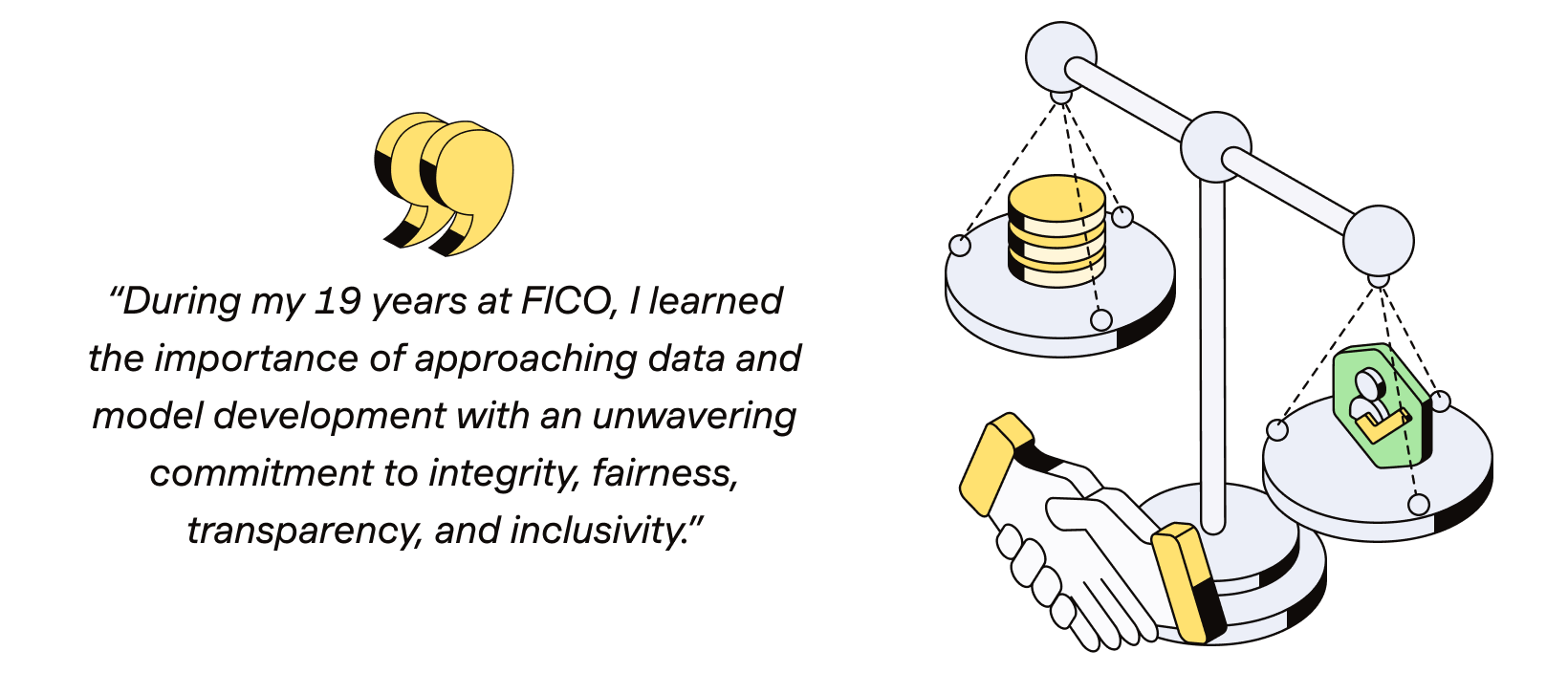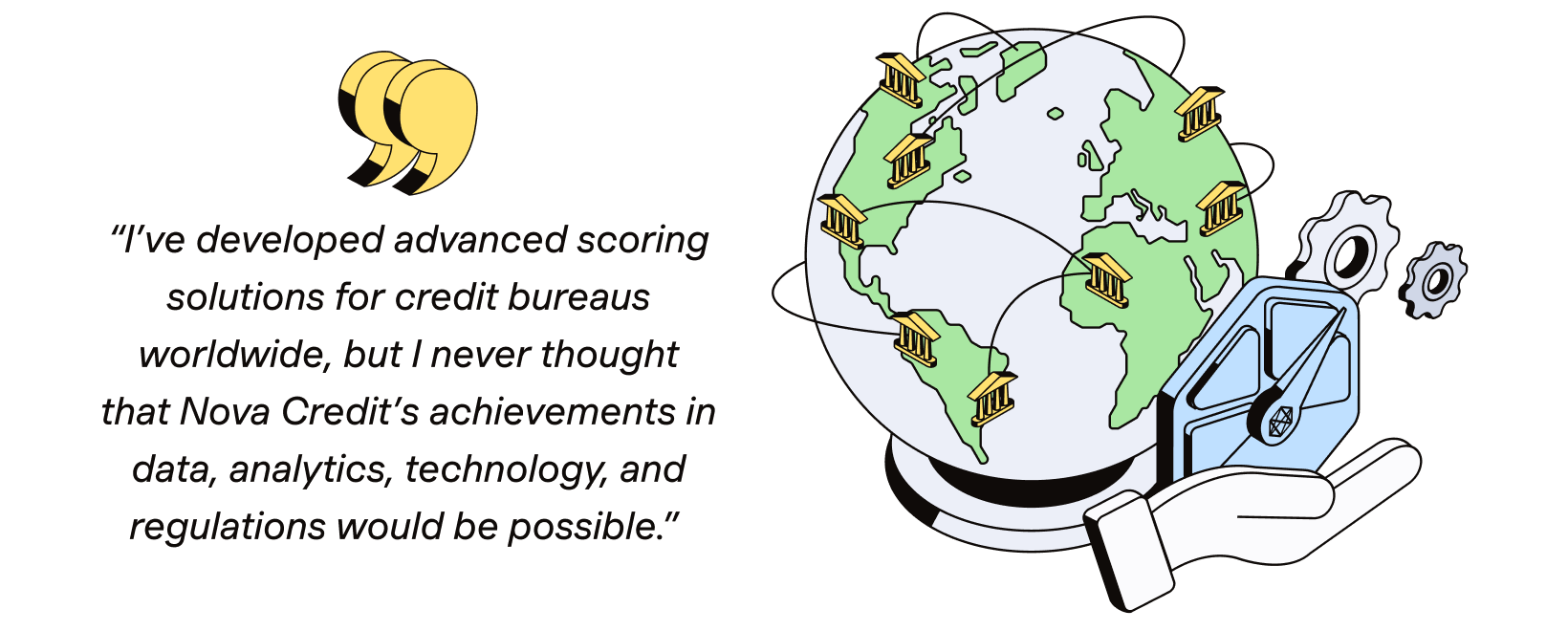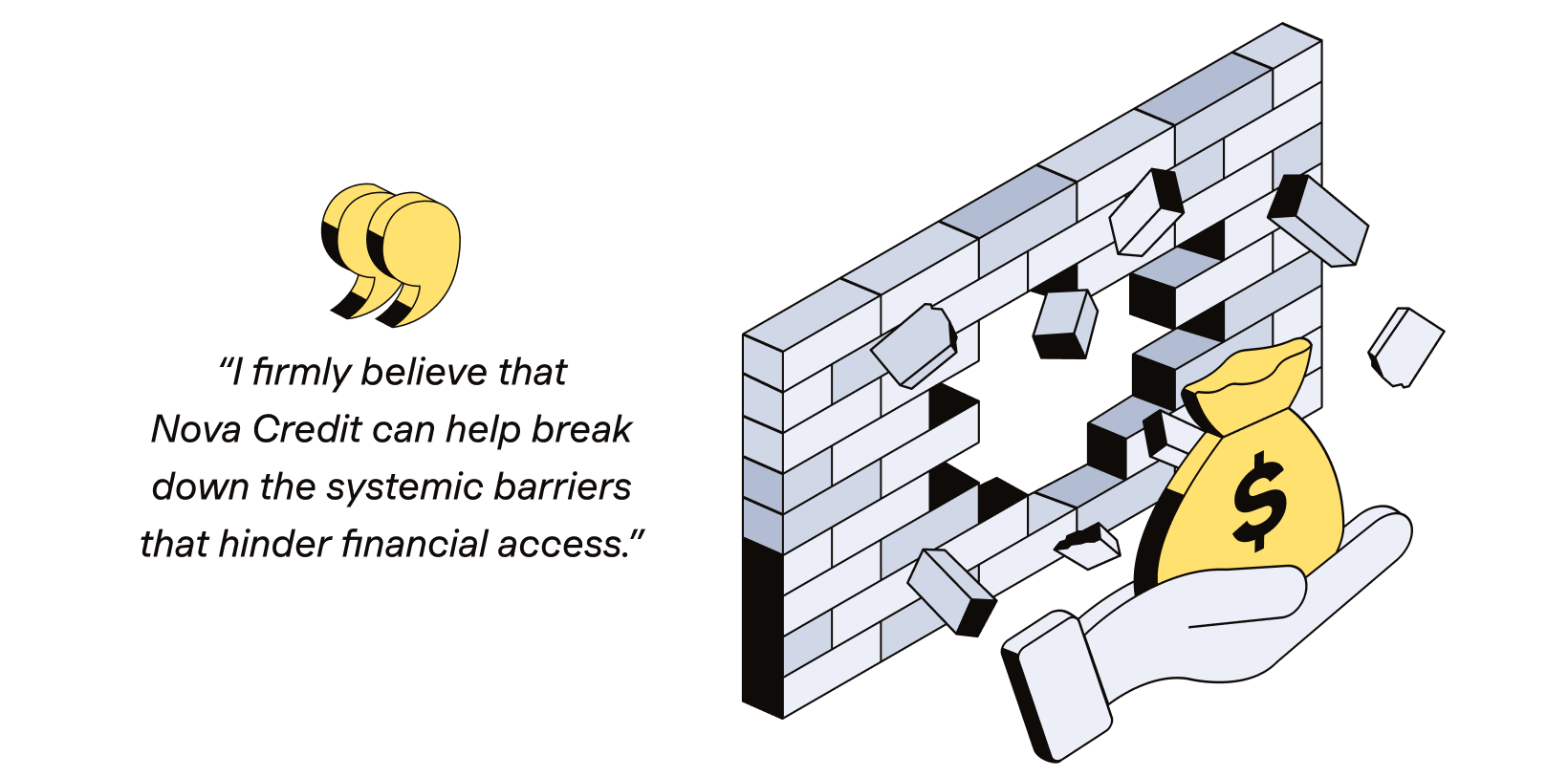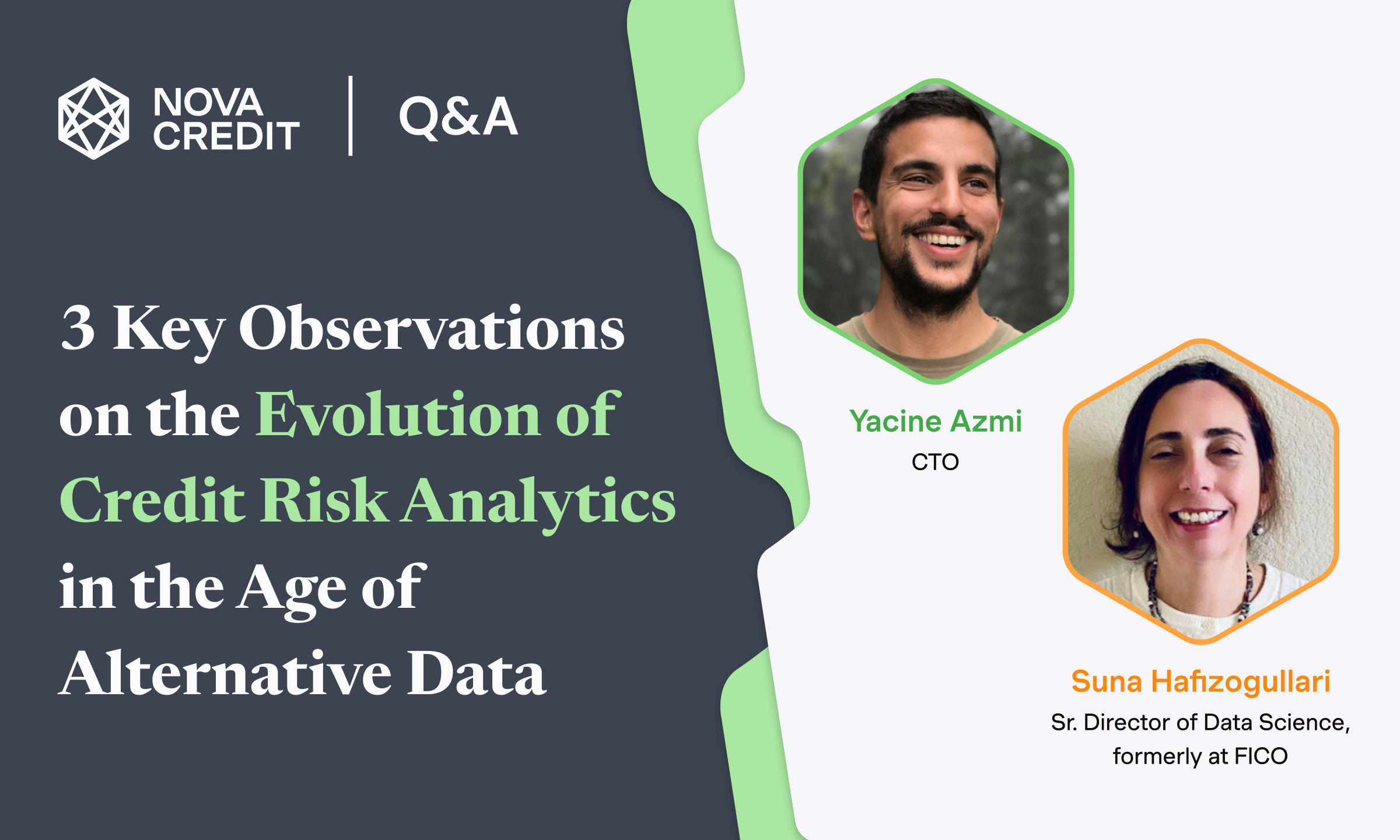3 Key Observations on the Evolution of Credit Risk Analytics in the Age of Alternative Data
Nova Credit's Senior Director of Data Science, Suna Hafizogullari, shares her recent observations on the changing role of global credit data, the importance of alternative data in credit and lending, and the future of credit risk analytics.

Alternative data is paving the way for financial inclusion in credit risk analytics by enabling lenders to extend credit products to more people. But as data proliferates and credit decisioning becomes more complex, lenders are faced with new challenges in identifying reliable risk signals. To meet these challenges head-on, lenders are forming data partnerships and prioritizing responsible processes that comply with tightening regulations.
Meanwhile, data scientists are championing alternative data as a means to expand financial access and improve credit decisioning accuracy. At the same time, they are grappling with concerns about potential bias as AI and machine learning become more prevalent in credit risk analytics. Striking the right balance between innovation and responsibility is crucial for the future of inclusive credit access.
One of the leading voices in this space is Nova Credit's Senior Director of Data Science, Suna Hafizogullari, who recently sat down with our Chief Technology Officer, Yacine Azmi, to talk about the alternative data opportunities and challenges lenders face today. Suna has been at the forefront of leveraging alternative data sources, advanced analytics, and machine learning to drive innovation and expand access to credit. Before she joined Nova Credit, Suna served as Senior Director at FICO, where she developed and implemented a wide range of FICO scoring solutions across credit risk, marketing, economic impact, and healthcare. Her product savviness and mission-driven approach have earned her a reputation as a staunch advocate for financial inclusion. At Nova Credit, Suna heads our data science practice for Credit Passport®: the world's only cross-border credit data solution.
In this interview, Suna opens up about the changing role of global credit data, the importance of alternative data in credit and lending, and the future of credit risk analytics. These are her top three expert observations on the evolution of credit risk analytics in the age of alternative data:
Consumer attitudes are reshaping the credit industry as the U.S. prepares to embrace open banking. A secure data and compliance foundation is the cornerstone of an effective underwriting strategy amidst shifts in consumer preference and regulatory requirements.
Credit decisioning challenges are causing alternative data usage to rise. Once reliable credit risk signals are becoming harder to identify. To improve the accuracy of their credit decisioning, lenders must adapt and form partnerships that expand access to data. This can help offset the noise caused by the proliferation of credit builder products, soft inquiry data, government stimulus programs related to COVID-19, and data gaps in Buy Now, Pay Later (BNPL) transactions.
AI and machine learning may represent new sources of bias in financial decisioning. As AI and machine learning become more prevalent in credit risk analytics, there is an increased risk of introducing bias into credit decisioning models. Data scientists must leverage transparent data models to ensure fair decisioning.
Read the full interview below:
Yacine: Welcome to Nova Credit, Suna! We are excited to have you on board as Senior Director of Data Science for our flagship product, Credit Passport®, which allows newcomers to use their credit history to apply for financial products in their new country.
Suna: Thank you, Yacine. I’m also thrilled to join the team and am looking forward to taking Nova Credit to the next level in credit infrastructure and analytics.
Yacine: Can you tell us about your experience in the credit industry, particularly your time at FICO, and how it has shaped your approach to data science?
Suna: Absolutely! Starting my career at FICO felt like winning the lottery. FICO is a place where advanced analytics meet real-world problems. There, I had the honor and privilege of working with leaders in this field. I delved deep into the nuts and bolts of credit risk analytics, developing scoring models, and rolling out solutions worldwide. I saw firsthand how data is more than just numbers; it impacts people's lives and financial well-being.
During my 19 years at FICO, I learned the importance of approaching data and model development with an unwavering commitment to integrity, fairness, transparency, and inclusivity. My goal was to create a more equitable financial system that provides a fair opportunity for a wider range of individuals. One of my pivotal learning experiences involved working with alternative data sources.

At FICO, I acted as a bridge between North America and other regions with less developed financial systems, where access to traditional credit data was scarce. In these areas, alternative data like mobile phone and e-wallet usage became invaluable for assessing creditworthiness in both consumer and Micro, Small and Medium Enterprises (MSME) lending spaces.
I learned valuable lessons about microlending while traveling to parts of Africa and Asia, and saw how microloans can significantly impact the lives of small business owners, especially women. These loans can help entire families escape poverty. As a result, I became more meticulous about the decisions I made when evaluating, collecting, and processing the data, and then utilizing it for the development of scoring systems used in underwriting decisions.
Responsibly integrating diverse data types requires confirming their accuracy, predictive power, coverage, depth, regulatory compliance, and orthogonality. This ensures that our models, developed using non-traditional sources, support a more equitable financial system.
Transparent data models enable both the lender and consumer to view credit scores not just as a risk ranking tool with the highest predictive power on the development and validation datasets but as a holistic product that guides both parties on their path to responsible lending and financial inclusion.
Yacine: What attracted you to Nova Credit?
Suna: Missions drive me. As an immigrant, my journey toward building financial inclusion in this country started with a $200 secured credit card. I've reached a point in my life where I want to give back by contributing direct, meaningful value. My unique life experiences have given me a deep understanding of the challenges immigrants face when trying to establish credit in a new country.
Having developed and delivered credit scoring models in various parts of the world, I have extensive knowledge of the data and analytics that drive the credit system. This places me in a unique position. As data scientists, we have a tremendous opportunity to create systems that are analytically sound, transparent, fair, equitable, and explainable.
Nova Credit also occupies a unique position in this space. Credit Passport® is a trailblazing product in its efforts to establish pathways between newcomers' countries of origin and their destinations in a reliable, transparent, trustworthy, and compliant way. I’ve developed advanced scoring solutions for credit bureaus worldwide, but I never thought that Nova Credit’s achievements in data, analytics, technology, and regulations would be possible.

Nova Credit integrates credit bureaus globally with lending institutions while prioritizing consumer financial health and education. We protect and standardize personal and credit bureau data for credit decisions in compliance with the regulations set by both the consumer's home and their new country. This is an amazing service that greatly advances financial inclusion, not just in one country but around the globe.
Yacine: Can you tell us how credit data has evolved throughout your career, and what significant trends or changes have impacted credit decision-making?
Suna: It’s been a journey, Yacine! Credit data has transformed massively. Initially, credit scores focused mostly on traditional credit products like personal and auto loans, credit cards, and mortgages, along with payment histories. Data was limited to what credit bureaus and lenders provided based on existing relationships with their customers. Credit profiles were based on a snapshot of information at the time of scoring. The concept of “trended credit bureau data” still hadn’t been introduced when consumers' full credit histories came from the credit bureau data.
Today, we're in a whole new world. Fintechs have introduced new credit builder products such as BNPL loans, peer-to-peer lending platforms, marketplace lending, and early wage access programs. We're seeing a wider variety of data come into play. Utility bills, rent payments, and even streaming service payments are all becoming part of credit history. It's about gaining a fuller picture of someone's financial habits.
One of the biggest changes I’ve witnessed has been the rise of alternative data. Consumers are now taking control of their financial destinies by allowing lenders to access more comprehensive profiles, which include data beyond the traditional monthly debt cadence reported to the bureaus or based solely on bank data. It’s opened up the credit market to many who were previously invisible to it, like young adults just starting out, individuals excluded from the financial system due to life events such as a job loss, divorce, or illness, and those who've moved from another country.
This consumer-permissioned data is pivotal, as it represents a shift toward more inclusive financial experiences. The landscape has moved beyond examining someone's past payment history in their credit bureau report to obtaining a comprehensive 360-degree view of their financial life. Technology has played a key role in this change, with AI and machine learning revolutionizing data analysis.
Yacine: The credit industry is indeed dealing with more forms of data and data connectivity than ever before. How can data science teams support organizations in leveraging AI and machine learning while avoiding pitfalls in the current landscape? Which areas or applications of data science do you predict will have the biggest impact on the credit industry in the near future?
Suna: That's a great question, Yacine. AI and machine learning are revolutionizing data analysis. Data scientists can identify trends and make predictions in ways I never would have imagined possible at the start of my career. The velocity, volume, variety, veracity, and value—which we call the five Vs of data—have changed dramatically in the past decade, thanks to these mind-blowing advances.
AI and machine learning can inform better data insights and decision-making. However, enhanced data capabilities require a heightened sense of responsibility. We must be very cautious about bias and discrimination to ensure fairness in how these models are developed and used.
Regulations and consumer attitudes are also important factors to consider. As people grow more aware of how their data is being used, new regulations have been adopted. Data science teams should avoid black box models and prioritize transparency and accuracy for high predictive power on historical data that’s ethical, fair, and interpretable to mitigate unintended biases and discrimination.
Data science teams are vital in monitoring models and algorithms to ensure they accurately assess credit risk without unfairly discriminating against certain segments of the population. This ongoing oversight is crucial to maintain the fairness and effectiveness of these models under changing market conditions and regulatory environments, from both data and credit risk perspectives.
I want to highlight that, while data science is an exciting domain that builds off a deep understanding of statistics, mathematics, and computer science, the “art” of it allows us to balance new technologies like AI with the need to understand what the data is telling us about consumer behavior in an unbiased and transparent way. As data scientists, we must act as ambassadors for the ethical use of consumer data in a conscientious manner.
Yacine: How do you plan to leverage your experience in the credit industry to enhance our data science capabilities here at Nova Credit?
Suna: At Nova Credit, our teams handle data from different countries, standardizing it for interpretation by various financial systems. This requires a profound understanding of credit bureau data and adherence to regulatory standards set by both the country of origin and the adopted country. Our data scientists ensure data integrity and security by enforcing robust data governance and privacy measures. They safeguard sensitive information, conduct data cleansing, and maintain a deep understanding of the data utilized.
I plan on leveraging my deep understanding of credit risk analytics and scoring models to help us refine our algorithms and methodologies, ensuring they are robust, transparent, and cater to diverse consumer profiles, particularly those underserved by traditional credit systems. I aim to use my experience with alternative data sources to expand our market reach in alignment with our mission of financial inclusion.
Finally, I intend to foster innovation within our team, encouraging the adoption of new technologies and methodologies that can advance our mission transparently and ethically, without compromising quality. By staying at the forefront of data science and credit analytics, we can continue to provide cutting-edge solutions that empower immigrants to achieve financial independence and success.
Yacine: What excites you most about joining our team at Nova Credit, and how do you envision contributing to our mission of enabling financial access for newcomers to the country?
Suna: What excites me most about joining the team at Nova Credit is the opportunity to directly impact the lives of people in situations similar to my own past. Enabling financial access for newcomers is a mission that resonates deeply with me because I understand the challenges and barriers that immigrants face when trying to establish credit in a new country firsthand. I firmly believe that Nova Credit can help break down the systemic barriers that hinder financial access. It's not just about providing a service; it's about leveling the playing field and offering a fresh start to those striving to build a new life.

Nova Credit occupies a unique space and fosters data that few companies in the industry can access, as we create pathways between tens of bureaus to the selected inbound markets. We’re well-positioned to continuously innovate with the support of rich data and advanced analytics. One of the most exciting things about joining Nova Credit is the opportunity to expand into the consumer-permissioned data space, where we excel.
We can better assess the creditworthiness of new customers when we combine credit bureau data and alternative data sources. As Senior Director of Data Science, my goal is to form strategic partnerships with financial institutions that strengthen Nova Credit’s mission, expand our reach, and augment our influence. I look forward to building out products that evaluate cash flow and affordability, detect fraud, and manage credit risk. By combining my extensive background in credit risk analytics and model development with Nova Credit’s advancements in alternative data, we’re creating financial products unlike any we’ve ever seen before: products that are truly inclusive on a global scale.
Learn more about Nova Credit’s Platform - a significant development in Nova Credit's ability to give lenders the power to underwrite anyone.
